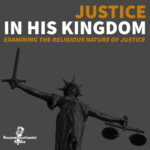
Chapter 16: The Consummation of the Kingdom
Chapter 16: The Consummation of the Kingdom
Written by David Chilton

Chapter 13: What Can the State Do?
Chapter 13: What Can the State Do?
Written by Ray Sutton

Chapter 16: Sodom and Gomorrah
Chapter 16: Sodom and Gomorrah
Written by Stephen Perks
From Christianity & Society, Vol. XII, No. 4 (October 2002)

Justice in His Kingdom
Written by
Justice is an ever-present topic of discussion, especially so in recent times. But how does our pagan world define and implement it? More importantly, how should Christians determine what is just and by what standard?
Jerri Lynn Ward and Roger Oliver’s Justice in His Kingdom Podcast will help you understand God’s standards for justice and how to break free of pagan, pragmatic ideas about how it should be defined and implemented. It will discuss His requirement to do justice in every area of life including foreign affairs, the laws of nations, courts and more.

12: Jovan Mackenzy, the Parousia, and Eschatology 101
12: Jovan Mackenzy, the Parousia, and Eschatology 101
Written by
Dustin was gone this week, but somehow we managed to keep the humor for the first segment. Jovan Mackenzy (Von Frasier), creator of the original #DatPostmil intro song, joined us to confront our Batman blasphemies from Episode 10. We took his rebuke into consideration and charged forward with some meatier eschatological discourse. In the second segment, we discussed the four primary views concerning the millennium of Revelation 20 (Dispensationalism, Historic Premillennialism, Amillennialism, and Postmillennialism) as well as the origins and history behind those terms. After that we discussed the various views concerning the New Testament use of the Greek term Parousia—the “coming” of Christ. We wrapped it all up in the last segment with a brief synopsis of the four basic interpretive frameworks for New Testament prophetic literature (Futurism, Preterism, Historicism, Idealism) and how they relate to the four primary views on the millennium!
Here are some recommended links for further study:
- Dispensationalism:
- What is a Dispensation? By Charles C Ryrie
- Why Every Calvinist Should Be a Premillennialist By John MacArthur
- The Second Coming: Signs of Christ’s Return and the End of the Age By John MacArthur
- Historic Premillennialism:
- Why I Am Not a Dispensationalist… By Jim Hamilton
- Revelation Sermon Series (Jim Hamilton)
- Revelation: The Spirit Speaks to the Churches (Preaching the Word) By Jim Hamilton
- Amillennialism:
- The Amillennial View of the Kingdom of God By Sam Storms
- The Book of Revelation By G.K. Beale
- The Bible and the Future By Anthony Hoekema
- Postmillennialism:
- Check out this helpful eschatology comparison
- An Evening of Eschatology (roundtable discussion hosted by Bethlehem College and Seminary)
- Views represented: Historic Premillennial Futurist, Amillennial Idealist, & Postmillennial Preterist
- Revelation: An Evangelical Symposium (sponsored by American Vision)
- Views represented: Futurism, Preterism, & Idealism

Immigration Series: Session 1: Immigration and the Sabbath
Immigration Series: Session 1: Immigration and the Sabbath
Written by

Part 2: Question 5: Are We Now Under the “Law of Christ” Rather Than the “Law of Moses”?
Part 2: Question 5: Are We Now Under the “Law of Christ” Rather Than the “Law of Moses”?
Written by Gary North and Gary Demar

Appendix C
Appendix C
Written by Gary North

Chapter 16
Chapter 16
Written by James B. Jordan

Conclusion – Chapter 14: Little By Little
Conclusion – Chapter 14: Little By Little
Written by Ray Sutton
